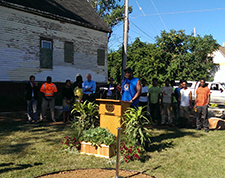Lead2Change: $65,000 will support the expansion of the agency’s “Dream. Explore. Build.” career readiness program from four to 11 sites for the 2016-17 program year.
Local Initiatives Support Corporation: $50,000 in support of the agency’s efforts to strengthen business corridors adjacent to the downtown development. It will convene MLK, Cesar Chavez, North Avenue, Avenues West and Harambee/Riverwest Business Improvement Districts to provide training by crime prevention through environmental design, deploy AmeriCorps and TA BID managers and deploy national resources.
Family Promise of Western Waukesha County: $40,000 to help enhance its services and program delivery to children and families moving from homelessness to permanent housing.
African American Chamber of Commerce: $25,000 to support a five-year strategic and implementation plan to build capacity and provide professional development for its staff and board.
Historic King Drive Business Improvement District: $25,000 to support efforts to build and strengthen social connections between local entrepreneurs, businesses, property owners and residents in Bronzeville and adjacent neighborhoods.
Hunger Task Force: $20,000 to support a mobile grocery store delivering fresh food at a reduced price to food deserts and underserved neighborhoods across Milwaukee County.
Great Lakes Community Conservation Corps: $15,000 to support the training of up to 200 urban youth in the installation of non-porous pavement materials in local development projects. The grant will leverage EPA funds as well as funds from the Housing Authority to pay for training and classroom learning time.
Burleigh Street Community Development Corp: $6,800 to support the Business Mixer Series in the Sherman Park neighborhood, a program that will include guest speakers and networking opportunities that give small businesses an opportunity to make business connections, expand their networks and promote their businesses.
Skylight Music Theatre Corp: $35,000 to support performing arts activities, educational touring shows, student matinee performances, and an apprentice program for aspiring young production artists.
First Stage Children’s Theater: $25,000 to support the Teaching Artist Training Program.
Islands of Brilliance: $25,000 to support children and young adults with Autism Spectrum Disorder to use technology in creative ways.
Riveredge Nature Center: $25,000 to support nature-based education experiences for urban students.
Wisconsin Conservatory of Music: $25,000 to support the Listen and Learn
Concert Series, which provides educational performances by conservatory faculty in schools.
Corporation for Enterprise: $12,500 to support development of a business plan for the implementation of a Children's Savings Account program in Milwaukee.
University of Wisconsin-Madison Foundation: $400,000 to support the Wisconsin Alzheimer Institute’s two-pronged approach to addressing the disease in the African American population. It will enroll 50 African Americans per year, for a total of 250, to undergo a repeat study to better understand the cognitive decline. It also will offer community programming that will enhance and sustain its commitment to reduce the stigma and increase outreach and education activities culturally tailored to serve families, improve early detection and diagnosis.
Black Arts Think Tank: $48,000 to support educational outreach and strategic partnerships to cultivate diverse audiences.
Disability Rights Wisconsin: $50,000 for an outreach and advocacy initiative to help African American families who have a child with a disability access services and to address racial disparities.
John Michael Kohler Arts Center: $100,000 (over two years) toward restoration work of iconic cement sculptures located throughout the late artist Mary L. Nohl’s property in Fox Point.
Aurora Foundation: $80,000 in support of research that will help predict the risk of heart damage in cancer patients who undergo chemotherapy.
Museum of Wisconsin Art: $50,000 to support curatorial and program staff.
UWM Foundation: $50,000 (over two years) to help UWM’s School of Information Studies’ Nonprofit IT build capacity of the program, which trains people to be IT leaders by providing hands-on experience through working with nonprofits that have technology needs.
Mequon Nature Preserve: $41,500 to support the design and land restoration plan with a focus on sediment and nutrient reduction for 100 acres of agricultural land.
COA Youth & Family Centers: $25,000 for editorial support and production of the “Precious Lives” podcasts and live pop-up shows.
Milwaukee County Historical Society: $25,000 for development of an exhibit of music in Milwaukee County.
C.U.P.E.D. Corp: $20,000 to support development of year-round visual and performance art in Milwaukee’s Bronzeville neighborhood.
Hispanic Professionals of Greater Milwaukee: $20,000 to support a board training and leadership program for its members.
Frank Zeidler Center for Public Discussion: $15,000 to bring international artist Anne Bray to Milwaukee to lead a diverse group of local artists, designers and other creatives in developing a public art and media project to prompt discussion of race dynamics in Milwaukee.
Wisconsin Philanthropy Network: $15,000 for a variety of training programs geared towards professionals new to the field to teach best practices in effective and ethical philanthropy.
Aurora Family Service: $13,000 for strength-based, solution-focused therapy training and education programs offered through the Family Therapy Training Institute.
Wild Space: $7,000 for a performance and outreach program at Villa Terrace Decorative Arts Museum that will include an environmental art installation by artist Roy Stabb and residencies and performances by students from Lincoln Middle School of the Arts and Riverside High School.
Wisconsin Historical Foundation: $5,000 to support the book “Milwaukee: A City Built on Water.”

More than $330,000 invested into area visual arts programming>